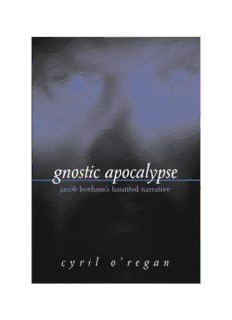
Gnostic Apocalypse: Jacob Boehme's Haunted Narrative PDF
Preview Gnostic Apocalypse: Jacob Boehme's Haunted Narrative
Chapter Title i GNOSTIC APOCALYPSE ii Gnostic Apocalypse Chapter Title iii GNOSTIC APOCALYPSE Jacob Boehme’s Haunted Narrative CYRIL O’REGAN STATEUNIVERSITYOFNEWYORKPRESS iv Gnostic Apocalypse Cover image:Corbis Images Published by State University of New York Press,Albany © 2002 State University of New York All rights reserved Printed in the United States of America No part of this book may be used or reproduced in any manner whatsoever without written permission.No part of this book may be stored in a retrieval system or transmitted in any form or by any means including electronic, electrostatic,magnetic tape,mechanical,photocopying,recording,or otherwise without the prior permission in writing of the publisher. For information,address State University of New York Press, 90 State Street,Suite 700,Albany,NY 12207 Production by Judith Block Marketing by Patrick Durocher Library of Congress Cataloging-in-Publication Data O’Regan,Cyril Gnostic apocalypse : Jacob Boehme’s haunted narrative / Cyril O’Regan. p.cm. Includes bibliographical references and index. ISBN 0-7914-5201-8 (alk.paper)—ISBN 0-7914-5202-6 (pkb. : alk.paper) 1. Bèhme,Jakob,1575–1624. I. Title. BV5095.B7 O73 2002 230'.044'092—dc21 2001049420 10 9 8 7 6 5 4 3 2 1 Dedicated to Niall Meehan O’Regan This breathing in the dark sheds no light.Its catch and release opens like a bedroom door on a swollen carpet until its arc achieves the gaiety of swing. This is familiar,familial,a now of sound inflected by desire between the stasis of hesitations, a dream that wants to worry the stars. September’s blue of recall flames furiously purple.You rise from the wound red,perfect.I run into beauty’s trip-wire,my mind falling into a shout. Tugged by an invisible moon you bring my ancestors,humors and sweat and hope routing their lives.But more you are the plan I cannot read,the sketch whose outline is not formed, the boat to the future the aftermath of the barque tumbling over the edge of the world. v Contents Acknowledgments ix Introduction 1 Part I: Visionary Pansophism and the Narrativity ofthe Divine 27 Chapter 1. Narrative Trajectory of the Self-Manifesting Divine 31 1.1. Boehme’s Six-Stage Narrative 32 1.2. Narrative Teleology: Narrative Codes 50 1.3. Trinitarian Configuration of Ontotheological Narrative 52 Chapter 2. Discursive Contexts of Boehme’s Visionary Narrative 57 2.1. Alchemy as Discursive Context and its Sublation 58 2.2. Narrative Deconstitution of Negative Theology 69 Part II: Metalepsis Unbounding 83 Chapter 3. Nondistinctive Swerves: Boehme’s Recapitulation of Minority Pre-Reformation and Post-Reformation Traditions 87 Chapter 4. Distinctive Swerves: Toward Metalepsis 103 4.1. Distinctive Individual Hermeneutic and Theological Swerves 104 4.2. Narrative Swerve: Metalepsis 115 Chapter 5. Boehme’s Visionary Discourse and the Limits of Metalepsis 129 vii viii Contents Part III: Valentinianism and Valentinian Enlisting ofNon-Valentinian Narrative Discourses 141 Chapter 6. Boehme’s Discourse and Valentinian Narrative Grammar 147 6.1. Toward Geneology 156 Chapter 7. Apocalyptic in Boehme’s Discourse and its Valentinian Enlisting 161 7.1. Apocalyptic Inscription and Distention 169 Chapter 8. Neoplatonism in Boehme’s Discourse and its Valentinian Enlisting 177 8.1. Valentinian Enlisting of Neoplatonic Narrative 187 Chapter 9. Kabbalah in Boehme’s Discourse and its Valentinian Enlisting 193 9.1. Valentinian Enlisting of the Kabbalah 205 Conclusion: Genealogical Preface 211 Notes 225 Index 277 Acknowledgments While my interest in the seventeenth-century German speculative mystic Jacob Boehme dates back to my undergraduate days in Dublin,and while I spent considerable time charting the relation between Boehme and Hegel in The Heterodox Hegel,at no time did I think that I would write a book on this fig- ure.There was neither the time nor the need.Or so I thought.Need,however, gave birth to time.As the Gnostic return project got under way it became ob- vious that an examination of Boehme was inescapable,since,arguably,it is his discourse that represents the site of introduction of Gnosis into the field of modern discourse.In its birth I am grateful to a number of people.I owe much to two Irish friends,to John Doyle for first introducing me to a thinker whose opacity made Hegel and Heidegger look positively lucid,and to Brendan Pur- cell for his unfailing support for this strange interest.I am deeply indebted to Louis Dupré who encouraged my interest in the mystical traditions.My study with him,both as a student and colleague of his at Yale,of Eckhart,Cusa,and Pseudo-Dionysius,as well as the Kabbalah and Eastern forms of mysticism not only proved illuminating and fruitful,it was also exciting,pursued as it was under the assumption that these discourses were both philosophically and reli- giously important.Such study created a space for reexamining even more mar- ginal speculative mystics of the Christian tradition, as well as providing a vocabulary and the outlines of a syntax of the discourse of the Christian mysti- cal tradition that if it could not fit all occasions,was appropriate to many.John Jones,editor at Crossroad,was an early cheerleader in my first attempts to write on Boehme in the Gnosticism project,although he had been equally enthusi- astic about my earlier unpublished work.Denying anything like an elective affinity with speculative mysticism,colleagues at Yale such as David Kelsey, Wayne Meeks,and Gene Outka were deeply reassuring in their openness to entertaining a claim for importance that had little prima facie plausibility.As was the case with Gnostic Return in Modernity,Gene Outka was supererogatory ix
Description: